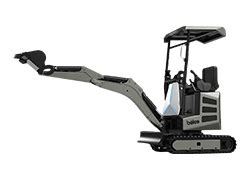mini giant excavator n220 model 124175 leaking hydrolics In this blog post, we’ll explore some of the most common issues that occur with mini excavator . A 2,000-pound mini excavator, which some call a micro mini excavator, can dig up to 6 feet deep and is perfect for small landscaping jobs or digging close to a structure. For slightly larger jobs such as grading and .
0 · Troubleshooting Common Mini Excavator Issues: From Starters
1 · Troubleshooting Common Issues with Mini Excavator Final Drives
2 · 9 Most Common Problems With Mini Excavators And How To Fix
Browse a wide selection of new and used NISSAN N21SS Mini (up to 12,000 lbs) Excavators auction results near you at TractorHouse.com
Q: Why does my mini excavator make loud noises but fail to start? A: Loud . Learn how to solve nine common issues with mini excavators, such as hydraulic .
In this blog post, we’ll explore some of the most common issues that occur with mini excavator . Q: Why does my mini excavator make loud noises but fail to start? A: Loud noises without startup generally indicate starter motor issues. Troubleshoot the starter, checking battery charge, electrical connections, starter relay, and motor gear engagement. Learn how to solve nine common issues with mini excavators, such as hydraulic leaks, engine trouble, broken boom, and more. Find step-by-step instructions and tips for replacing seals, filters, tracks, buckets, and motors.In this blog post, we’ll explore some of the most common issues that occur with mini excavator final drives and provide step-by-step troubleshooting tips to help you keep your machine running smoothly. 1. Leaking Hydraulic Fluid Symptoms: Visible oil stains under the machine. Loss of hydraulic power or sluggish performance. Causes:
A hydraulic leak occurs when there is an unintended escape of hydraulic fluid from the system. These leaks are often a result of wear and tear, leading to compromised seals, damaged hoses, or loose fittings. For leak detection, a visual inspection should be the first step—which involves checking for wet spots or drips on and around the hydraulic cylinder which usually indicate a leak. In addition, using a pressure gauge to test if the cylinder is maintaining the required pressure can help confirm a leak’s presence and severity. #1. Hey, brothers. I just hit 1000 hours on my John Deere 35G and that means a bunch of maintenance items are due, including a couple of filters on the hydraulic system.
By following these steps and taking into account the specific circumstances of your mini excavator's final drive leak, you can make an informed decision between repairing or replacing the affected components. The hydraulic system that makes your compact equipment functional will eventually have problems, and the sooner you can fix those problems the sooner you'll be up and running again. Here are three troubleshooting tips which may seem obvious to some of you but are worth a quick review. Tip #1 - Identify What the Problem Is. Maximize mini excavators' performance with hydraulic system maintenance tips. Learn how to inspect it and extend equipment life. However, at times, the excavator may lose hydraulic power due to various faults in the complex hydraulic system. This article will explain why the excavator loses power when the hydraulics becomes hot.
Q: Why does my mini excavator make loud noises but fail to start? A: Loud noises without startup generally indicate starter motor issues. Troubleshoot the starter, checking battery charge, electrical connections, starter relay, and motor gear engagement. Learn how to solve nine common issues with mini excavators, such as hydraulic leaks, engine trouble, broken boom, and more. Find step-by-step instructions and tips for replacing seals, filters, tracks, buckets, and motors.
In this blog post, we’ll explore some of the most common issues that occur with mini excavator final drives and provide step-by-step troubleshooting tips to help you keep your machine running smoothly. 1. Leaking Hydraulic Fluid Symptoms: Visible oil stains under the machine. Loss of hydraulic power or sluggish performance. Causes:A hydraulic leak occurs when there is an unintended escape of hydraulic fluid from the system. These leaks are often a result of wear and tear, leading to compromised seals, damaged hoses, or loose fittings. For leak detection, a visual inspection should be the first step—which involves checking for wet spots or drips on and around the hydraulic cylinder which usually indicate a leak. In addition, using a pressure gauge to test if the cylinder is maintaining the required pressure can help confirm a leak’s presence and severity. #1. Hey, brothers. I just hit 1000 hours on my John Deere 35G and that means a bunch of maintenance items are due, including a couple of filters on the hydraulic system.
By following these steps and taking into account the specific circumstances of your mini excavator's final drive leak, you can make an informed decision between repairing or replacing the affected components. The hydraulic system that makes your compact equipment functional will eventually have problems, and the sooner you can fix those problems the sooner you'll be up and running again. Here are three troubleshooting tips which may seem obvious to some of you but are worth a quick review. Tip #1 - Identify What the Problem Is. Maximize mini excavators' performance with hydraulic system maintenance tips. Learn how to inspect it and extend equipment life.
2004 cat 287b skid steer loader
Troubleshooting Common Mini Excavator Issues: From Starters
2004 skid steer trailer 18ft

Troubleshooting Common Issues with Mini Excavator Final Drives
Our mini digger & driver hire services in Sutton covers a wide spectrum of work and aspects to building projects including small, medium and large jobs in excavation and groundwork. .
mini giant excavator n220 model 124175 leaking hydrolics|9 Most Common Problems With Mini Excavators And How To Fix